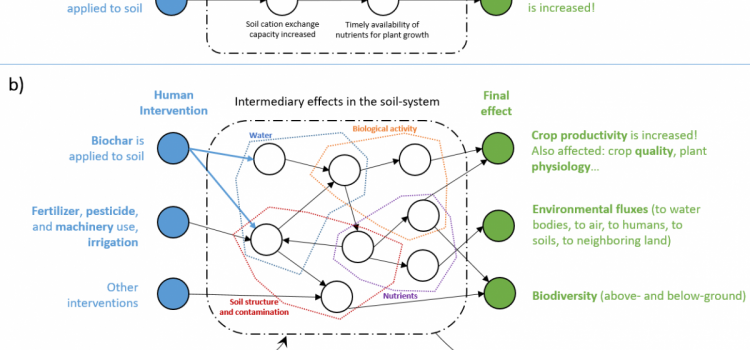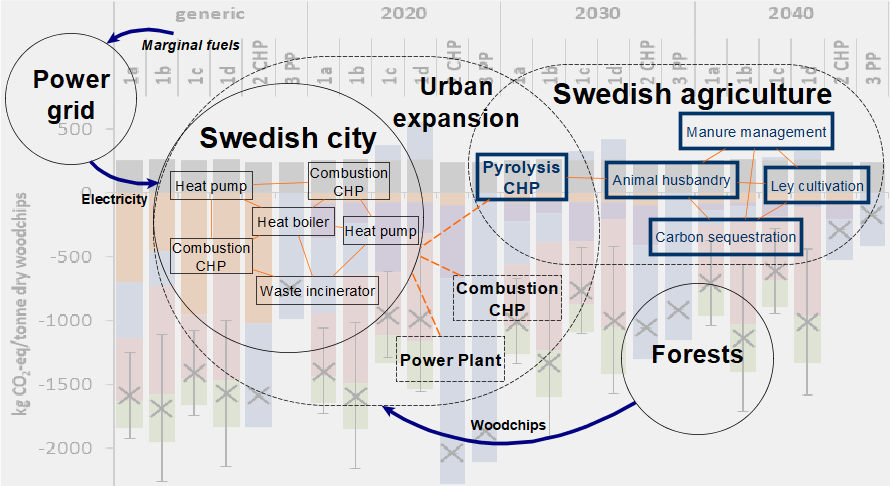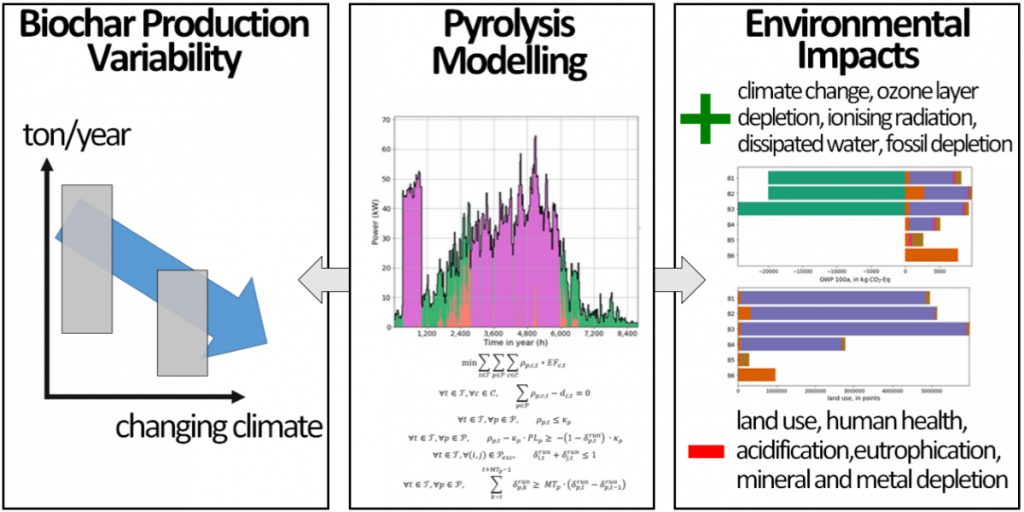
In this Vinnova-funded project (2017-2021), we model the life cycle climate and environmental impacts of new biochar applications in Sweden. We develop a methodological framework to assess the system effects of biochar production and use, and apply it to three case studies.
Case study 1 – Prospective Life Cycle Assessment of Large-Scale Biochar Production and Use for Negative Emissions in Stockholm
Several cities in Sweden are aiming for climate neutrality within a few decades and for negative emissions thereafter. Combined biochar, heat, and power production is an option to achieve carbon sequestration for cities relying on biomass-fuelled district heating, while biochar use could mitigate environmental pollution and greenhouse gas emissions from the agricultural sector. By using prospective life cycle assessment, the climate impact of the pyrolysis of woodchips in Stockholm is compared with two reference scenarios based on woodchip combustion. The pyrolysis of woodchips produces heat and power for the city of Stockholm, and biochar whose potential use as a feed and manure additive on Swedish dairy farms is explored. The climate change mitigation trade-off between bioenergy production and biochar carbon sequestration in Stockholm’s context is dominated by the fate of marginal power. If decarbonisation of power is achieved, building a new pyrolysis plant becomes a better climate option than conventional combustion. Effects of cascading biochar use in animal husbandry are uncertain but could provide 10–20% more mitigation than direct biochar soil incorporation. These results help design regional biochar systems that combine negative carbon dioxide emissions with increased methane and nitrous oxide mitigation efforts and can also guide the development of minimum performance criteria for biochar products.

Azzi, E. S.; Karltun, E.; Sundberg, C. Prospective Life Cycle Assessment of Large-Scale Biochar Production and Use for Negative Emissions in Stockholm. Environ. Sci. Technol. 2019
Appearances in the news:
- Dagens Industri – 2020-09-15 Ny forskning: De vill rädda klimatet med kol
- NyTeknik – 2019-12-05 Forskare: Stor biokolfabrik ger klimatnytta
- SverigesRadio – 2019-10-02 Kol hett som klimatlösning men hur gör det bäst nytta?
- NyTeknik – 2017-03-21 Klimatnyttan med biokolen granskas
Case study 2 – Small-scale biochar production on Swedish farms: potential, variability, and environmental performance
Several small-scale pyrolysis plants have been installed on Swedish farms and uptake is increasing in the Nordic countries. Pyrolysis plants convert biomass to biochar for agricultural applications and syngas for heating applications. These projects are driven by ambitions of achieving carbon dioxide removal, reducing environmental impacts, and improving farm finances and resilience. Before policy support for on-farm pyrolysis projects is implemented, a comprehensive environmental evaluation of these systems is needed. Here, a model was developed to jointly: (i) simulate operation of on-farm energy systems equipped with pyrolysis units; (ii) estimate biochar production potential and its variability under different energy demand situations and designs; and (iii) calculate life cycle environmental impacts. The model was applied to a case study farm in Sweden. The farm’s heating system achieved net carbon dioxide removal through biochar carbon sequestration, but increased its impact in several other environmental categories, mainly due to increased biomass throughput. Proper dimensioning of heat-constrained systems is key to ensure optimal biochar production, as biochar production potential of the case farm was reduced under expected climate change in Sweden. To improve the environmental footprint of future biochar systems, it is crucial that expected co-benefits from biochar use in agriculture are realised. The model developed here is available for application to other cases.
- Work was presented in workshops & at a conference (Biochar II, 2019)
- Model developed is available here https://github.com/ntropy-esa/P2_farm_biochar
- Research article now published: https://doi.org/10.1016/j.jclepro.2020.124873

Case study 3 – Smart uses of biochar in urban environments, a case study in Uppsala’s new districts
Work is on-going (2020-08 to 2021-02).
Methodology piece – How to frame the diversity of biochar effects in a way that makes sense?
- Publishing of article is on-going… Work was presented in workshops with project partners.
Webinar – Overview of biochar deployment in Sweden & related life cycle assessments